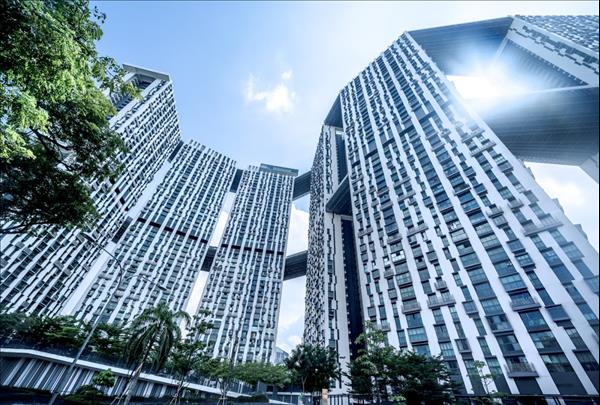(MENAFN- Asia Times) Singapore's housing market is going through some big changes. It has a dual market structure consisting of a public and a private market. The public housing market is divided into a primary and a secondary (resale) market.
The Housing & Development Board is responsible for building and selling public housing flats at concessionary prices in the primary market to Singaporeans.
The primary public housing market is regulated and only open to Singaporean families, subject to a monthly household income cap of 14,000 Singapore dollars (US$10,400). After meeting the minimum occupation period of five years, owners can sell their flats in the secondary public housing market to Singaporean citizens and permanent residents who do not own private houses.
The private housing market is a laissez-faire market that supplies non-landed houses, such as apartments and condominiums, as well as landed houses, such as terrace, semi-detached and detached houses. Foreigners are prohibited from owning public housing flats. While they can buy and sell non-landed apartments and condominiums, they can only buy landed houses on Sentosa Island.
Despite Covid-19-related disruptions to supply chains and economic activities, the benchmark private residential property price index experienced 12 consecutive quarters of growth of 25% total after exiting the“circuit breaker” in June 2020. The resale public housing price grew by 28% over the same period.
The government introduced three rounds of cooling measures to pre-empt housing prices from diverging from economic fundamentals. On December 16, 2021, the government raised the Additional Buyer's Stamp Duty (ABSD) - a form of transaction tax when buying private residential Singaporean properties - for foreigners from 20-30%.
The ABSD was also raised to 17% and 25% for Singaporean citizens and permanent residents respectively when buying second properties and 25% and 30% respectively when buying third and subsequent properties. Property developers also pay the ABSD of 40% - but 35% is remittable if developed units are sold within five years of the land acquisition date.
Another intervention occurred on September 29, 2022, when government agencies raised the medium-term interest rate floor - which is used to calculate the loan quantum granted by private financial institutions for property purchases - from 3.5-4%. The government also imposed a 15-month wait-out period for private owners to insulate first-time home buyers against intense competition in the public resale market.
The government is concerned about high housing prices weakening its social compact. Although foreign investments only constituted 7% of private property sales in 2023,
they significantly drove up private housing prices , especially in the luxury housing segment. The latest ABSD rate hikes were intended to check the flows of oversea“hot money”, which have inflationary effects on the private housing markets.
On April 26, 2023, the government increased the ABSD from 30-60% for foreigners when buying private residential properties in Singapore. Singaporean citizens and permanent residents will now have to pay ABSD of 20% and 30% respectively - an increase of 3% and 5% - when purchasing second private properties for investment purposes.
Private residential property prices are already at historically high levels, with average launch prices ranging from S$2,000-S$2,900 (US$1,485–$2,153) per square foot. The current median housing price is 14 times that of medium-income - such high prices will make the private housing market unaffordable and inaccessible for medium-income families.
Using a recent project launched after the new ABSD rule, Blossoms by the Park, a local buyer purchasing a 3-room unit at S$2.28 million (US$1.7 million) will make a down payment of S$570,000 (US$423,000), based on a loan-to-value ratio of 75%.
Because of the 4% interest rate floor, their monthly mortgage payment will be S$10,360 (US$7,693). Based on the total debt servicing ratio of 55%, their monthly income must be at least S$18,840 (US$13,990) to obtain a mortgage loan from a local bank. This means that only the top 10% of Singaporean households by income could afford the unit in the Blossoms by the Park.
Interest rate hikes and geopolitical tension add significant risks to investing in private real estate markets. If macro-risks trigger negative economic outcomes - such as recession and unemployment - private housing market prices could spiral, leading to more socioeconomic consequences.
While the potential effects of the new ABSD of 60% are unclear, the costs of inaction could be more detrimental regardless of the direction private housing prices go.
A market failure could have a widespread impact on every stakeholder In the market. Developers may not recover the costs of investments and local buyers will face a negative equity situation when their housing value drops. Foreigners will lose money by selling their properties below the original costs.
The housing market crash would destabilize Singapore's financial system when borrowers default on their mortgage loans. But the economic costs of inaction would be higher than an intervention that curbs short-term foreign investment flows into the property market.
Tien Foo Sing is the Provost's Chair Professor at the Department of Real Estate, Business School, National University of Singapore. The views expressed here are the author's and do not represent the views of their companies and affiliates.
This article was originally published by East Asia Forum and is republished under a Creative Commons license.
Like this:Like Loading...




















Comments
No comment